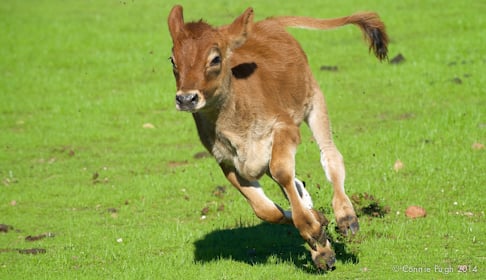The show, which convened a group of strangers in a remote, rural setting with the mission of creating a perfect society, could simply bid farewell to the volunteer participants as they returned to their homes. But there were three stars who had no homes to return to: cows Betsy and Honey and Honey’s young daughter.
Betsy and Honey were purchased by “Utopia” producers to be used for milk by the show’s participants. Both were pregnant, and Honey gave birth during production, becoming the mother of a female calf dubbed, tellingly, “Ca$h.”
The three might have been sent back into dairy production when the show ended, but “Utopia’s” veterinarian advised against exposing this bovine family to the bleak existence that constitutes regular life for dairy cows. Producers instead sought a happier home for the cows, and their search led them to Farm Sanctuary. Soon, we were welcoming the trio to our Northern California Shelter.

The reluctance of the show’s producers and veterinarian to consign Betsy, Honey, and Meredith to lives in dairy production says a lot. After all, they had bought the cows in order to use them in a money-making venture. Yet, having encountered these animals as individuals, those responsible for them balked at seeing them harshly exploited in a production setting.
In dairy production, cows are subjected to a grueling cycle of impregnation, birth, and milking, with just a few short months of rest between pregnancies. Their babies are taken from them within hours of birth — their daughters to be raised as eventual replacements for their mothers in the milking herd, their sons to be raised for cheap beef or slaughtered as babies for veal. After four or five years of this ordeal, cows are deemed “spent.” At this point, their bodies are frail and exhausted from years of unnaturally high milk production. In pain and weariness, they limp onto the trucks that will take them to slaughter. The dairy industry deals in unnatural separation and premature death.
Knowing this makes it all the more poignant to watch Honey’s daughter, renamed Meredith, enjoying her life at the shelter. This healthy, happy, and confident calf is groomed, fed, and looked after by Betsy and Honey, and both are very protective of their little one. With such good mothering, Meredith is able to enjoy the carefree calf-hood that most dairy calves never have. She runs and bucks and frolics, unable to contain her joy at being alive.
Betsy, still pregnant, is due in February. Loving and kind to both humans and her fellow cows, she is devoted to Honey and Meredith. Her bond to Meredith is so strong that she started lactating early to provide milk to Meredith, likely when Honey developed mastitis.
Poor Honey has been very sore from her infection, which makes nursing especially painful. In order to ease Honey’s mastitis, halt lactation for both cows, and wean Meredith (who is now old enough to eat solid food), we have fitted the moms with special udder bras that prevent nursing.
Ideally, Meredith would be able to nurse from her mom as long as both of them wanted, but industrial breeding has hampered this loving exchange: Dairy cows’ bodies are now designed to make more milk than a calf could possibly drink. Excessive lactation makes cows prone to mastitis, even when the excess milk is drained. Honey went without her twice-daily milkings for only a few days between the show’s cancellation and her arrival at our shelter, and yet in that short time she developed this painful condition. Once designed by nature to nurture calves, the bodies of dairy cows have been altered to feed the human populace instead of their own young.
Fortunately, Betsy, Honey, and Meredith have found a home where their caregivers will do everything they can to ensure their health and happiness, easing any vestigial difficulties or pains inflicted by industrial breeding. This new home, where animals rescued from abuse and neglect bear the scars of their former lives yet joyfully embrace their new ones, is no utopia. It’s better, because it’s real. It’s sanctuary.






